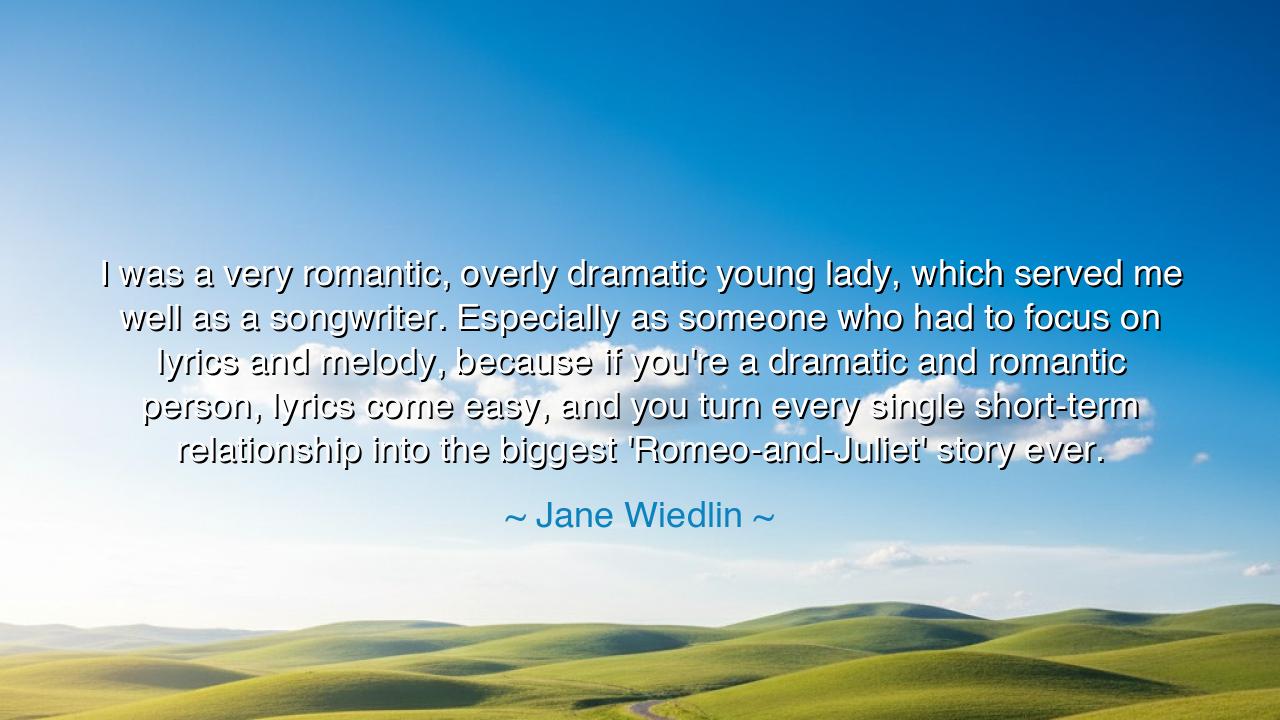
I was a very romantic, overly dramatic young lady, which served
I was a very romantic, overly dramatic young lady, which served me well as a songwriter. Especially as someone who had to focus on lyrics and melody, because if you're a dramatic and romantic person, lyrics come easy, and you turn every single short-term relationship into the biggest 'Romeo-and-Juliet' story ever.






The words of Jane Wiedlin—“I was a very romantic, overly dramatic young lady, which served me well as a songwriter. Especially as someone who had to focus on lyrics and melody, because if you’re a dramatic and romantic person, lyrics come easy, and you turn every single short-term relationship into the biggest ‘Romeo-and-Juliet’ story ever.”—are both playful and profound. In them, she admits that her youthful intensity, her romantic spirit and her tendency toward drama, which might have seemed excessive in ordinary life, became the very soil from which her artistry grew. For what others might dismiss as exaggeration, she transformed into song—songs that captured not only her own heart but the hearts of those who listened.
To be romantic and dramatic is to feel the world with heightened senses. Every glance carries meaning, every heartbreak feels like a tragedy, every joy like a triumph. This intensity may burden the soul, but for the artist, it is a gift. Wiedlin reveals that such sensitivity makes lyrics and melodies come easily, for when one lives in heightened states of passion, words naturally shape themselves into poetry, and feelings into music. What could be overwhelming in life becomes transcendent in art.
Her mention of “Romeo and Juliet” is no accident. Shakespeare’s tale is the archetype of youthful love magnified into myth—short, intense, dramatic, and unforgettable. In likening her fleeting romances to this story, Wiedlin shows how the romantic heart elevates every experience into something larger than life. A short-term love affair may last weeks, but to the romantic songwriter, it becomes an epic tragedy or an immortal love song. This transformation is the alchemy of art: to take the ordinary and make it extraordinary, to turn personal experience into universal truth.
History offers us countless mirrors of this truth. Consider the poet Lord Byron, who lived passionately, recklessly, dramatically. His affairs, though often brief and chaotic, gave rise to poetry that still stirs the human heart centuries later. Or think of Franz Schubert, whose lieder (songs) transformed fleeting emotions and moments of longing into works of immortal beauty. Like Wiedlin, these artists were not ashamed of their excess of feeling—they embraced it, and in doing so, gave the world treasures.
The meaning of Wiedlin’s words, then, is twofold. First, it honors the power of youthful passion—that even when it seems foolish or excessive, it holds the seeds of creativity and inspiration. Second, it teaches that nothing is wasted when it is transformed into art. Broken relationships, fleeting loves, and moments of melodrama can all become material for creation, reminders that our deepest vulnerabilities are often the doorway to our greatest strengths.
The lesson is clear: do not despise your sensitivity, your longing, your tendency toward drama. Instead, learn to channel it. The world does not need more indifference; it needs more passion transformed into beauty. If you are a writer, pour it into words. If you are a musician, let it become melody. If you are neither, let it guide you toward compassion, understanding, and the courage to live fully. For to feel deeply is not a curse—it is a calling.
Practically, this means embracing your experiences, even the painful and short-lived ones, as fuel for growth and expression. Write them down, sing them out, paint them, or simply let them teach you empathy. Like Wiedlin, you may find that what once seemed like excessive emotion becomes your greatest gift. And in this way, your own “Romeo-and-Juliet” moments—though fleeting—can live on as stories, songs, or wisdom that touch others for generations.
Thus, Jane Wiedlin’s confession shines as timeless wisdom: romance and drama, when channeled, are not weaknesses but sources of power. To the young, they may seem burdens; to the artist, they are treasure. And for us all, they are reminders that life is richest when we allow ourselves to feel deeply, to imagine greatly, and to transform even our smallest loves into something eternal.






AAdministratorAdministrator
Welcome, honored guests. Please leave a comment, we will respond soon